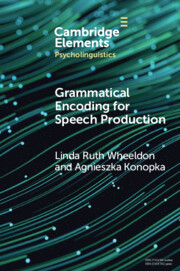This paper investigates the production of Persian–English bilingual compound verbs (BCVs) of the type [VERB+VERB]. In this type of code-switched structure, a lexical verb from the donor language English is combined with a light verb from the native language Persian. We tested the hypothesis that in Persian–English BCVs English verbs occupy the nominal slots of monolingual Persian complex predicates of the type [NOMINAL+VERB]. Two methodologies were used. A conversational-corpus analysis confirmed our predictions that Persian–English BCVs have translation-equivalent Persian compound verbs, that the English verbs denote the same action as the nominal constituents of those monolingual constructions, and that the support verbs tend to correspond in both types of compound verbs. A bilingual picture-word interference experiment provided evidence suggesting that English verbs interfere with the production of the nominal constituents of complex Persian verbs in Persian-bilingual speakers. We conclude that words from different word categories can compete for lexical access.

